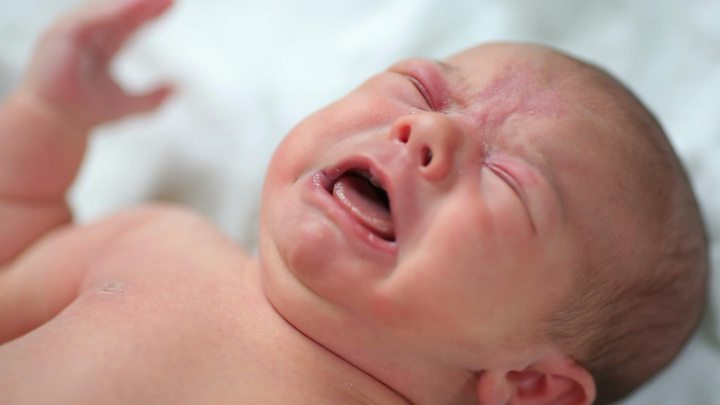Media playback is unsupported on your device
Women at 75% of UK maternity units are being denied their right to choose a Caesarean, the BBC's Victoria Derbyshire programme has been told.
NICE guidance says women should be allowed to opt for a planned Caesarean even if it is not for medical reasons.
Of the 146 trusts that shared their policies with the Birthrights charity: 26% fully complied with the guidelines, 15% refused all elective Caesareans.
The government said women should be given the right options as appropriate.
Under the guidelines, women requesting a Caesarean with no other medical reason "should be offered appropriate discussion and support – but ultimately, if they are making an informed choice, a Caesarean should be offered".
They also state that if one obstetrician is unwilling to perform an elective Caesarean, the woman should be referred to another who will.
Birthrights, the human rights in childbirth charity, used a Freedom of Information request to ask 153 trusts providing maternity care how they applied the guidance.
Of the 146 that replied:
- 26% fully complied with the guidelines
- 47% partially complied
- 15% refused maternal requests outright
- 12% did not seem to have a clear position
One woman whose request was denied was Lucie Tidman, 32. When she gave birth to her first child, six years ago, she had a serious haemorrhage and was later diagnosed with post-traumatic stress disorder (PTSD).
During her second pregnancy, she asked for a Caesarean, to avoid any more trauma, but was told it was not possible.
She had another haemorrhage and her baby went to neo-natal intensive care.
"She had to have rescue breaths and my other half saw her come out purple," she said. "She got taken one way and I got taken to theatre. It was horrific."
Ms Tidman said the consultant she had met had not listened to her concerns.
"He was just going on the fact of 'this is your second birth, there's no reason why it should happen again'. But he didn't look into why we were anxious about it."
What is a Caesarean birth?

Media playback is unsupported on your device
Caesarean sections are when a baby is delivered by making a surgical cut into the abdomen and womb.
They fall into three categories:
- elective – at the mother's request
- planned – usually for medical reasons, such as the baby is either in the wrong position or very large
- emergency – usually because of complications during labour
More than a quarter of all babies born in England are now delivered by either elective or emergency Caesarean.
Mental health professionals agreed that cases like Ms Tidman's needed to be taken more seriously.
Consultant perinatal psychiatrist Rebecca Moore said: "For some, non-mental-health-based colleagues, perhaps there's a perception about anxiety, or a misunderstanding about how severe anxiety can be for some women, so women are often denied Caesareans perhaps because there's a lack of understanding about how unwell they actually are."
Confusion
Birthrights said it handled more requests for support from women unable to access a Caesarean section than any other issue.
It said the reasons women gave for wanting Caesareans included previous traumatic births, mental ill-health, childhood sexual abuse, or having made an informed decision after examining the evidence.
Its chief executive, Rebecca Schiller, said women faced a lot of confusion over whether a Caesarean would be granted, with decisions varying between trusts and even within trusts depending on which doctor or midwife they saw.
"Some women say they have had cost quoted at them – 'You can't have a Caesarean because it will cost too much,' the trust might be fined, that the clinical commissioning groups themselves won't fund those requests – but there doesn't seem to be one reason," she said.
The charity said it had been told trusts had even been telling women they would not be allowed to elect a Caesarean, either when they had been being booked on to maternity care or in a letter before they had even been spoken to.
It costs about £700 more to have a Caesarean, compared with a vaginal delivery.
Prof Baskaran Thilaganathan, from the Royal College of Obstetricians and Gynaecologists, said: "I don't think there is any circumstance under which, if you feel a woman has been informed, understands her choices and chooses to, that you could deny her the right to that."
Gill Walton, chief executive of the Royal College of Midwives said: "Women must be given the information to explore their views and feelings about Caesarean birth, to enable them to come to an informed decision about their preferred type of birth.
"This information should reflect the individual woman's current and previous medical, obstetric and psychological history."
A Department of Health and Social Care official said: "It is vital that women feel informed and supported in making safe choices around childbirth and we expect doctors and other NHS staff to work closely with mums-to-be to make sure they are given the right options where appropriate."
The Royal Cornwall Hospitals Trust, where Ms Tidman gave birth, said it practised evidence-based care with respect to Caesarean sections.
"If a woman requests a Caesarean section when there is no clinical indication, we follow the guidelines… but only after thorough exploration of all the issues," a spokesman said.
Watch the BBC's Victoria Derbyshire programme on weekdays between 09:00 and 11:00 BST on BBC Two and the BBC News channel in the UK and on iPlayer afterwards.
[contf] [contfnew] 
BBC
[contfnewc] [contfnewc]





